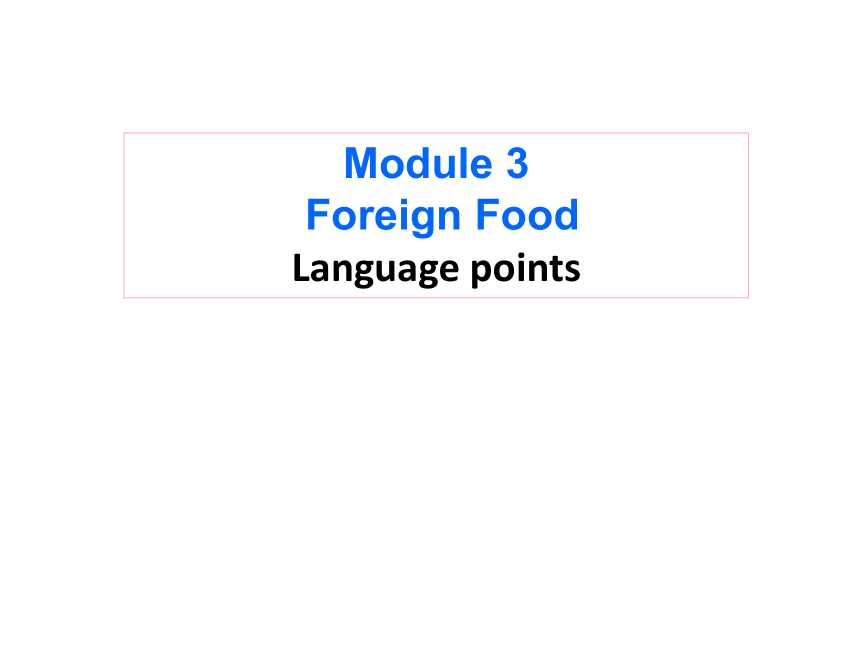(
课件网) Module 3 Foreign Food Language points 1. In fact, I think that they are sometimes obsessed with it. 事实上,我觉得他们有时候对此到了痴迷的程度。 be obsessed with/by … 迷恋,着迷 He's obsessed by computers. 他迷上了电脑。 She's completely obsessed with him. 他让她神魂颠倒。 2. I had eaten Chinese food often, but I could not have imagined how fabulous a real Chinese banquet could be. 1)宾语从句,结构为:how+形容词+陈述语序。 引导宾语从句时,how可以修饰形容词、副词; You can hardly imagine how fast Ken runs. how也可单独使用,表示方式或程度。 You can hardly imagine how I miss you. 2) could have done “过去可能做了” 或“ 过去本来可以做”, 用于肯定句,否定句,或疑问句。 I could have run 100 meters in twelve seconds. 我本来可以用12秒跑100米的。 She couldn't have said such a thing. 她不可能说出这种话的。 3. The first six or seven dishes seemed to fill the table, with plates dangerously balanced on top of another. I thought this vast wave of food was the total number of dishes to be served, and I started eating greedily. 六七道菜好像就摆满了一桌子,危险地放在另一个盘子上面。 我认为就上这么多菜了, 于是贪婪地吃了起来。 1) balance verb balance ...against ... 将……与……权衡balance advantages against disadvantages 2) balance noun keep/lose one's balance 保持/失去平衡 break the balance 打破平衡 3) balanced adj. 平衡的;均衡的 a balanced diet 均衡的饮食 balance vt.使平衡 n.平衡,平稳 4. No wonder my fellow guests had had only a few bites of each dish; 怪不得跟我一起的客人每道菜也就浅尝几 口. It is no wonder that…(it is not surprising) 并不让人惊讶;并不奇怪 No wonder the children are excited - this is the first time they've been abroad. 孩子们那么兴奋并不奇怪———这是他们第一次出国。 5. Stomach, intestines, ears, tongue, tail, hoof, and lungs are all likely to end up on the dinner table in front of you. 胃、肠、耳朵、舌头、尾巴、蹄子以及肺, 最终都很有可能出现在你面前的餐桌上。 1) likely: adj. 很可能的,可能要发生的 be likely to do sth It is likely that ... e.g. Tickets for the concert are likely to be expensive. It's quite likely that we'll be in Peking this summer. 2) end up: to finally be in a particular place or situation 最后(处于);最后(成为);(以…)告终 【拓展】 end up with sth 以……结束; end up in … 最终处于……; end up as … 最终成为……; end up doing… 1)I ended up doing all the work myself. 2)If you go on like this you'll end up in prison. 3)If you don’t try your best, you may end up with a negative score. 6. Just when I got used to it, I found another variety on a trip to Hunan. 就在我刚刚适应了它的时候,我在到湖南的一次旅行中又发现了另外一种。 be/get used to (doing) sth.: to become familiar with sth. 对……适应,习惯于 1)I'm not used to eating so much at lunchtime. 2)I can’t get used to the fact that you’re grown up now. used to: shows that a particular thing always happened or was true in the past, especially if it no longer happens or is no longer true 过 ... ...

